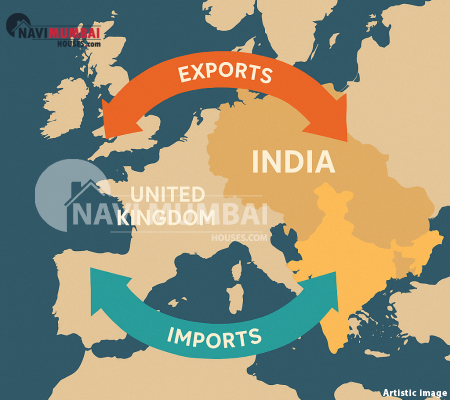
India and the United Kingdom are back in trade negotiations—and analysts see significant promise. A comprehensive India-UK trade pact could unlock new export corridors, increase foreign investment inflows, and enhance economic cooperation across sectors. The consensus is: it’s not just about tariffs—it’s about structural change.
Given both nations’ complementary strengths—India’s manufacturing & tech growth, UK’s capital & services domains—the deal holds strategic importance.
What Experts Are Saying & Key Levers
Export Growth Potential
-
The UK remains one of India’s key export markets, especially for pharma, chemicals, textiles, engineering goods, jewelry, and IT services. A pact could ease tariff barriers, quotas, and standards compliance.
-
Experts suggest exporters in Tier II / III cities may benefit significantly as compliance burdens ease.
-
The agreement might include mutual recognition agreements (MRAs) for standards, making Indian goods more acceptable in the UK market.
Investment & Capital Flows
-
A strong trade deal could increase FDI from the UK into Indian infrastructure, renewable energy, real estate, fintech, pharma and more.
-
Indian firms may gain more access to UK capital markets, partnerships, or joint ventures.
-
The pact can also help reduce regulatory & tax risks for UK investors in India (e.g., dispute mechanisms, investor protections).
Supply-Chain & Services Integration
-
With better trade terms, Indian component / intermediate manufacturers can more seamlessly integrate into UK / Europe supply chains.
-
Services (IT, digital, fintech, health tech) can gain easier entry, e.g. through visa expansions, mutual recognition, and data flow agreements.
-
The pact could lead to sector-specific agreements (e.g. financial services, digital trade, education, healthcare) to supplement tariff components.
Experts’ Cautions & Conditions
-
Trade agreements are long-term; benefits may take years to fully accrue.
-
Sectors vulnerable to competition (e.g. dairy, agriculture) may need protective measures or gradual liberalization.
-
Implementation, customs facilitation, infrastructure logistics, port capacities, and trade policy consistency will decide the pact’s success.
-
India must align regulatory standards, IP protection, dispute resolution mechanisms to match UK / global norms.
Why This Pact Could Be Game-Changing
-
Diversification of export markets: Beyond the U.S. and the Gulf, a UK pact offers a stable, developed market with premium demand.
-
Capital, technology, and knowledge transfer: UK investment can bring advanced technologies, R&D, sustainable practices.
-
Boost to “Make in India / Atmanirbhar” agenda: With improved market access abroad, Indian manufacturers get confidence to scale.
-
Strengthen geopolitical & economic ties: Deepening trade links also bolster diplomatic, cultural and institutional partnerships.
In short: the pact can help India evolve from export growth to export sophistication.
What Stakeholders Should Do Now / Watch
Monitor negotiation announcements
Keep ear to policy updates, expected timelines, draft outlines of trade & services chapters.
Identify beneficiary sectors & clusters
Exporters in textiles, chemicals, pharma, engineering, digital should align their supply and standards readiness.
Upgrade compliance & quality systems
Prepare for stricter standards, certifications, lab testing, packaging and traceability.
Seek joint ventures or partnerships
UK firms looking for Indian partners—or vice versa—should position themselves early.
Lobby for safeguards & transition support
Ensure sensitive sectors get adequate protection or phased liberalization to avoid disruption.
Conclusion
The prospective India-UK trade pact offers more than tariff relief—it promises structural integration across trade, investment, services, and value chains. Experts believe the deal could meaningfully boost India’s exports, attract UK capital, and expand India’s role in global supply chains.
But success hinges on execution: rigorous regulatory reforms, investor protections, standards harmonization and logistics readiness. If done well, this pact could be a strategic leap for India’s ambitions on the global economic map.
Visit Us: Navimumbaihouses.com or Call Us @ 8433959100
The post India-UK Trade Pact: Experts Say It Could Fuel Exports & Investments appeared first on .

